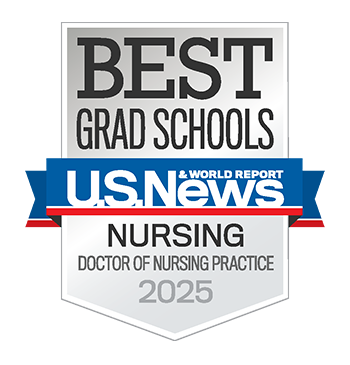DNP Post-Master’s/MPH Dual Degree
Need your questions answered?
Program formally known as Doctor of Nursing Practice (DNP) Executive/MPH Track program
OVERVIEW
Amplify Your Impact
Combining its two world-leading programs, the dual DNP Post-Master’s/MPH dual degree offered through the Johns Hopkins School of Nursing and the Johns Hopkins Bloomberg School of Public Health integrates cutting-edge nursing and population health frameworks to prepare nurse leaders to address the most critical public health challenges of our time. This program will position you to take on national and global health leadership roles that employ systems-level thinking to improve population health and advance health equity. You will tackle local and global health challenges by shaping policy, interventions, and quality improvements to create lasting change.
The DNP Post-Master’s Track is designed for nurses who already hold a master’s degree in a nursing specialty from a fully-accredited institution and want to take the next step. Graduates of the DNP Post-Master’s Track are prepared to create and lead new models of care delivery for communities locally and globally.
Students have the opportunity to specialize in their own areas of interest by tailoring their public health elective coursework. These elective courses, in combination with foundational public health and nursing coursework, will enhance the knowledge base for the combined DNP/MPH project that students undertake in their third year of the program. The combined DNP/MPH project offers students the opportunity to synthesize their knowledge and skills in nursing and population health to develop, implement, and assess a scholarly project.
DNP Post-Master’s Specializations
The DNP Post-Master’s Track is designed for experienced nurses ready to lead change and shape the future of health. New for 2026, students can choose to specialize their program in one of six areas—Leadership, Health Policy, Planetary Health, Nursing Education, Global Health, and Artificial Intelligence—each crafted to deepen expertise and expand impact.
Program Details
Tuition & Fees
Estimated Tuition Cost: $1,785 per credit See Cost of Attendance Details
Financial Aid: There are numerous options for financing your education including grants, scholarships, federal loans, and employment programs. Learn more.
Upcoming Application Deadlines
Summer entry: Nov 1 and Jan 15
Requirements
Admission Criteria
Master’s Degree in Nursing from an ACEN or CCNE accredited college or university or an equivalent degree from a comparable foreign institution
Scholastic GPA of at least 3.0 on a 4.0 scale
RN licensure
Three Letters of Recommendation (2 professional and 1 academic preferred)*
Official Transcripts (from all previous colleges/universities)
GRE scores optional**
Current Resume/CV
Goal statement/project proposal (demonstrating commitment to nursing practice and scholarly pursuit)
Two years of health-related work experience
Interview with faculty (if moved forward by admissions committee)
Applicants who earned fewer than 552 clinical hours as part of their advanced nursing coursework should email [email protected] for information about the best pathway to your DNP**
Information for applicants with international education
*References should be recent, written for the purpose of your application to this program and from professors who know you as a student or employers who know you as a professional in a job setting preferably in a supervisory role. Personal references from colleagues, friends, or family members do not meet the requirement. It is strongly preferred that at least one of your letters comes from someone that potentially could serve as your organizational mentor.
**Standardized test scores (GRE, GMAT, LSAT, or MCAT) are optional for this program. The admissions committee will make no assumptions if a standardized test score is omitted from an application, but will require evidence of quantitative/analytical ability through other application components such as academic transcripts and/or supplemental questions. Applications will be reviewed holistically based on all application components.
*** Applicants are required to have 375 clinical hours as part of their advanced nursing coursework. Students who have between 375 and 552 clinical hours will have to complete additional clinical hours as part of a practicum. If you have an entry-to-practice Master’s degree, earned fewer than 552 clinical hours as part of your advanced nursing coursework, or hold a Master’s specialty in education, please email [email protected] to discuss your educational background with an Admissions Counselor.
Prerequisites
DNP Prerequisite Course
Graduate Level Biostatistics (3 credits): Demonstrates evidence of statistical literacy and statistical reasoning enabling students to critically read and evaluate healthcare literature. Course must be completed at a regionally accredited college or university with a letter grade of B or better. Grade of B- will not be accepted.
MPH Prerequisite Courses
One math course (ex. Algebra, Calculus, Statistics)
One introductory general biology course
One health-related science (ex. Nutrition, Microbiology, or Anatomy and Physiology) OR a second biology course
Student Sponsorship
This program does not qualify for F-1 or J-1 student sponsorship. Legal Permanent Residents and non-immigrants who are otherwise physically present in the U.S. and in a status that allows for full or part-time study, may pursue this program.
“Living on a boat for a year, I’ve become a lot more aware of climate change, really feeling that this is our biggest public health challenge. And I’ve pivoted my DNP project to that. … As with COVID, I think there’s this missing voice there—nurses—when it comes to policy development and analysis. It’s long overdue.” Cristina Watkins DNP/MPH student
Cristina Watkins DNP/MPH student
#1
No. 1 in the nation for its Doctor of Nursing Practice Program (DNP)
#2
No. 2 in the nation for its Nursing Master’s Program (MSN)
#3
No. 3 nursing school in the world, according to 2024 QS World University rankings
Curriculum
This dual degree can be completed in 80 credits with 448 practice hours.**** For a dual degree, all coursework must be completed before either degree is awarded.
Onsite Dates
The Doctor of Nursing Practice (DNP) – Post-Master’s program’s executive session format can be completed in six semesters of study, integrating approximately 3 on-site immersions of 3-4 days each during the first year and one on-site symposium event lasting 1 day the second year combined with online and virtual learning experiences. The DNP/MBA joins the DNP Post-Master’s program in year 2 of their 3 year program.
Plan of Study
First Year (Credits)
• Principles of Epidemiology or Epidemiologic Inference in PH (5 PH cr) (Summer Institute)
• Social and Behavioral Foundations of Primary Health Care (4 PH cr)
• The Tools of Public Health Practice (1 PH cr)
• Academic and Research Ethics at JHSPH (0 cr)
• Organizational and Systems Leadership for Quality Care (2 NR cr)
Term 1 (1st half Fall 1)
• Statistical Reasoning in Public Health (3 PH cr)
• Population Dynamics and Public Health (2 PH cr)
• Foundational Principles of Public Health (0.5 PH cr)
• The Role of Qualitative Methods and Science in Describing and Assessing a Population’s Health (0.5 PH cr)
Term 2 (2nd half Fall 1)
• Statistical Reasoning in Public Health II (3 PH cr)
• Life Course Perspectives on Public Health (4 PH cr)
• The Social Determinants of Health (0.5 PH cr)
Term 1 (1st half Spring 1)
• Problem Solving in Public Health (4 PH cr)
• Environmental Health (5 PH cr)
• Principles of Negotiation and Mediation for Public Health Professional (0.5 PH cr)
• Applications of Negotiation and Mediation for Public Health Professionals (0.5 PH cr)
Term 2 (2nd half Spring 1)
• Communications Primer for the Public Health Sciences (1 PH cr)
• PH Elective (3 PH cr)
• PH Elective (3 PH cr)
Second Year (Credits)
• Problem Discovery (3 NR cr) (112 hrs practicum)
• Health Information Systems and Patient Care Technologies (2 NR cr)
• Public Health Biology (3 PH cr)
• PH Elective (3 PH cr)
• Nursing Inquiry for Evidence-Based Practice (3 NR cr)
Term 1 (1st half Fall 2)
• Building Collaborations Across Sectors to Improve Population Health (0.5 PH cr)
• Psychological and Behavioral Factors That Affect a Population’s Health (0.5 PH cr)
• PH Elective (3 PH cr)
Term 2 (2nd half Fall 2)
• Systems Thinking in Public Health: Applications of Key Methods and Approaches (3 PH cr)
• Globalization and Population Health (0.5 PH cr)
• Translating Evidence into Practice (3 NR cr)
• Project Advancement (3 NR cr) (112 hrs practicum)
• Advanced Nursing Health Policy (2 NR cr)
Third Year (Credits)
• PH Elective (4 PH cr)
• PH Elective (3 PH cr)
• PH Elective (3 PH cr)
• Project Application (3 NR cr, 112 hrs practicum)
• Health Finance (2 NR cr)
Term 1 (1st half Fall 3)
• Biologic, Genetic and Infectious Bases of Human Disease (0.5 PH cr)
Term 2 (2nd half Fall 3)
• Health Advocacy (3 PH cr)
• Project Evaluation and Dissemination (3 NR cr, 112 hrs practicum)
• Clinical Data Management and Analyses (2 NR cr)
Term 1 (1st half Spring 3)
• Managing Health Services Organizations (4 PH cr)
Engage with Us
Join us soon for a tour, on-campus event or a virtual visit.
Request Information
Speak with Admissions to learn more about our programs.
Virtual Info Sessions
See recordings of some of our recent virtual info sessions.
Tuition & Other Costs
Financial aid
View the costs for the DNP Post-Master’s/MPH Dual Degree Program.
2025 – 2026
Scholarships & Grants: Grants are awards based on financial need that do not have to be repaid. Many students also benefit from scholarships and awards based on merit. Learn more.
Loans: Many students will avail themselves of loans to help finance their School of Nursing education. If necessary, we encourage you to borrow only what is absolutely essential to cover your educational costs. Learn more.
Employment: Many students locate part-time employment to help pay education expenses. Numerous positions are available on campus and within various community based organizations. These jobs provide students with opportunities to gain practical work experience. Most positions are funded through the Federal Work-Study Program. Learn more.
Frequently Asked Questions
The Doctor of Nursing Practice (DNP) is a doctoral degree for nurses at the highest level of nursing practice (https://www.aacnnursing.org/Education-Resources/AACN-Essentials). The dual DNP Post-Master’s/MPH dual degree offered through the Johns Hopkins School of Nursing and the Johns Hopkins Bloomberg School of Public Health integrates cutting-edge nursing and population health frameworks to prepare nurse leaders to address the most critical public health challenges of our time.
Students have the opportunity to specialize in their own areas of interest by tailoring their public health elective coursework. These elective courses, in combination with foundational public health and nursing coursework, will enhance the knowledge base for the combined DNP/MPH project that students undertake in their third year of the program.
Individual elective courses may be chosen from among online courses listed under:
• Areas of concentration
• Certificate programs
• Online courses listed under the JHSPH course directory.
Your advisor will support you in developing your individualized plan of study to meet your goals.
Yes, as a student in a degree program at JHSPH, you may take courses towards earning a certificate as long as it fits within your curriculum schedule. Completion of a certificate may also be accomplished after the DNP/MPH degree is earned.
Besides your home cohort at JHSON, you will likely share a large number of courses with your peers at JHBSPH, and especially with students who share similar interests with you as you sharpen your focus. Students at JHBSPH have a wide range of possibilities in tailoring their coursework, and full-time as well as part-time plans of study. Therefore, you will share classes with some of these students more than some others.
The Johns Hopkins University adheres to a policy about workload per credit. Your individual plan will vary by term and your elective choices. Please see the plan of study for an estimate.
The ideal candidate is a Masters-level nurse* with a strong interest in public health, who is looking to equip themselves with the knowledge, skills and practice to take up an executive role in healthcare. The candidate will have a strong academic and professional preparation, and will be prepared to undertake rigorous training from two nationally leading programs at Johns Hopkins. The candidate will be ready and eager to take advantage of the exceptional opportunities offered by these programs and employ their training to create impactful change to improve population health and health equity.
Your work in a professional setting also reflects your academic preparation and demonstrates your knowledge, skills, and interests in healthcare. In place of an academic recommender, select a reference from your professional setting who is most familiar with your academic preparation, interests, and demonstrated abilities.
You should develop a preliminary project plan that integrates your interests in nursing and population health. This plan should highlight your interests, background knowledge, and overall objectives. The project plan will form a key component of your letter of application and will help the Admissions Committee learn about your preparation and goals for the program. Your project proposal will substantially evolve as you undertake your training, engage in specific coursework designated for the DNP project and discuss your plans with your Advisor. It is important to be able to speak to the support you expect to receive from your organizational setting for your project. You should be able to identify how the MPH portion of the curriculum will contribute to achieving your personal and professional goals.
Contact Cesar Nuñez, Assistant Director of Recruitment for the DNP Post-Master’s tracks, at [email protected] with any additional questions or to schedule a phone call to discuss ways to make your application as strong as possible.
If you are not currently working in a practice environment where a DNP project might be feasible, please contact the Office of Admissions, [email protected], to discuss your options.

